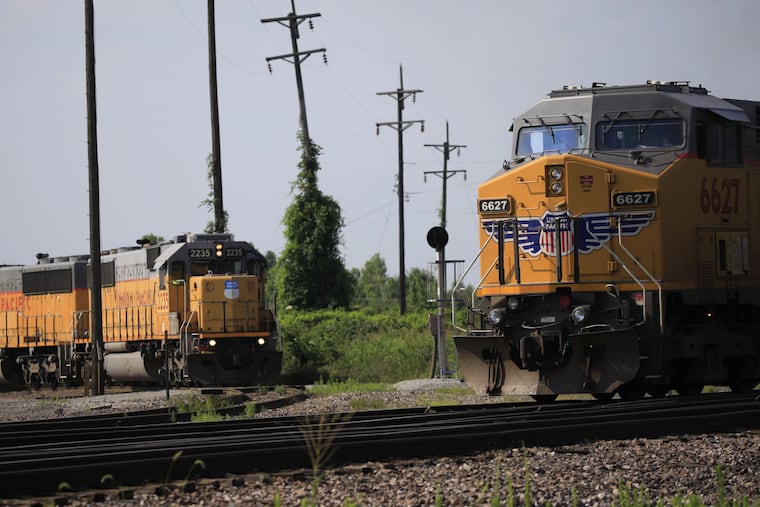Philly not likely to see Amtrak travel impacts if freight railroad strike happens
A nationwide strike could stop America’s freight railroads Friday. Here’s what you need to know.

» Update: A tentative railway labor deal has been reached, averting a strike, Biden says
Tens of thousands of workers who run U.S. freight railroads could walk off the job Friday, sidelining the roughly 7,000 trains that daily carry goods from coast to coast, including crucial deliveries of medical supplies, chlorine to wastewater treatment facilities, and coal to electric power plants.
A strike would put a crimp in the economy and disrupt an already overstretched supply chain, which has driven up the cost of consumer goods, fueling inflation.
» READ MORE: 1 railroad union rejects deal, 2 accept ahead of strike deadline
The Biden White House is working on contingency plans to move critical shipments and pushing the workers’ unions and the railroads to reach an agreement before 12:01 a.m. Friday, when a federally mandated “cooling off” period expires.
It seems unlikely a freight strike would inconvenience Philadelphia-area commuters much, if at all. Likewise for passengers using Amtrak to travel the Eastern Seaboard’s Northeast Corridor. But holders of tickets on one of Amtrak’s long distance routes elsewhere found canceled trains beginning Thursday.
» READ MORE: Businesses, White House plan for possible rail strike Friday
Who might strike and why?
Several of the 12 unions who’ve been negotiating for three years with the railway carriers have tentatively agreed to a new contract that was advanced by officials with the Biden administration. That proposal would give 24% raises, retroactive to 2020. But two unions representing 57,000 conductors and locomotive engineers are resisting and all the unions must agree to avert a strike.
At issue: What those unions call brutal, unpredictable schedules with no flexibility and requirements to be on call 24/7. Some workers say they are in danger of losing their jobs and careers if they need to take a day for medical care or a family emergency, because of punitive policies at some railroads.
Freight railroads already have said they need to hire about 40,000 workers to replace those who’ve retired during the pandemic.
What about Amtrak? Would its trains still run to and from 30th Street Station?
Rail service on the Northeast Corridor — which links Boston, New York, and Washington, with a major stop at Philadelphia’s 30th Street Station — will not see major disruptions.
However, Amtrak said it was canceling its long-distance trains Thursday so they don’t risk getting stranded before reaching their destinations.
The national passenger railroad runs nearly all of its 21,000 miles of routes across the country on tracks owned, maintained, and dispatched by freight railroad companies.
But Amtrak itself owns the tracks along the Northeast Corridor, its busiest route and largest revenue generator.
A strike would put a crimp in the economy and disrupt an already overstretched supply chain, which has driven up the cost of consumer goods, fueling inflation.
Acela business-class service would operate a full schedule in event of a strike, Amtrak said in a statement. A “small number” of departures on the slower Northeast Regional service could be affected, Amtrak said.
Adjacent routes such as the Keystone service that originates in New York, stops in Philadelphia and continues on to Harrisburg will not experience any disruptions, Amtrak said.
Don’t SEPTA trains use freight and Amtrak tracks?
Some commuter railroad lines in the Midwest and West are preparing to cut back operations significantly if there is a strike.
But SEPTA commuter trains have not used any freight railroad tracks since 2015, when the West Trenton Line was separated from track it shared with freight company CSX during a project to upgrade safety equipment, spokesman Andrew Busch said.
The Wilmington-Newark, Paoli-Thornburgh, and Trenton Regional Rail lines roll on Amtrak rails. SEPTA says Amtrak has assured them there will be no effect on their operations, Busch said.
“We’ve been talking with Amtrak and they don’t anticipate any backups or delays to spill over into SEPTA’s schedule,” he said.
What to do if a train you have tickets for is canceled?
Amtrak says it will give a full refund without cancellation fees or allow customers to change their reservations, waiving any difference in fare for departures through Oct. 31. The railroad will reach out to contact passengers who might be affected, it said.
Or customers can reach out to Amtrak.
Where could consumers feel the impact of a freight railroad strike?
Trains carry 30% of the nation’s freight.
Economists and businesses say a strike would disrupt the nation’s food supply, increasing prices for consumers and devastating farmers who are harvesting crops in many parts of the country.
Gasoline prices could rise again after cooling because refineries would not be able to ship as much product as they can when freight trains augment trucks and pipelines, industry officials have said.
The economic ripple effects would only widen the longer a strike lasts. Congress has the power to pass a resolution ending a strike and ordering the trains to run under federal railroad law.